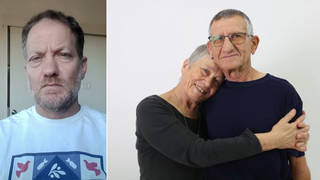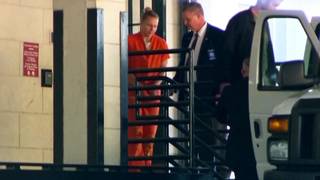
A new exposé and cover story in the September issue of the New Republic, titled “Married to the Mob: What Trump Owes the Russian Mafia,” examines how the Russian mafia has used the president’s properties to launder money and hide assets. We speak with the author, investigative journalist Craig Unger.
Transcript
NERMEEN SHAIKH: Well, we’ll go now to a new article called “Married to the Mob: What Trump Owes the Russian Mafia.” Those are the words on the cover of the September issue of the New Republic. Investigative reporter Craig Unger looks at how the Russian mafia has used the president’s properties, including Trump Tower and the Trump Taj Mahal, to launder money and hide assets. Unger writes, quote, “Whether Trump knew it or not, Russian mobsters and corrupt oligarchs used his properties not only to launder vast sums of money from extortion, drugs, gambling, and racketeering, but even as a base of operations for their criminal activities. In the process, they propped up Trump’s business and enabled him to reinvent his image. Without the Russian mafia, it is fair to say, Donald Trump would not be president of the United States.”
AMY GOODMAN: Craig Unger joins us now here in our New York studio, longtime reporter, author of several books, including House of Bush, House of Saud.
Welcome back to Democracy Now!, Craig.
CRAIG UNGER: Thanks for having me.
AMY GOODMAN: So, talk about why you chose to look at this. And talk about what you lay out as Donald’s ties to Russian mobsters.
CRAIG UNGER: Well, there’s been a lot of terrific reporting about Donald Trump’s relationship with Russia recently, but I wanted to see when was he first compromised by Russia. And I went back to 1984, when a man named David Bogatin, who allegedly had ties to the most powerful crime gang in Russia, walked into Trump Tower. This is a man who doesn’t really have any means of making a living that seems to be legitimate. He meets with Donald Trump, and he buys not one or two, but five luxury condominiums for more than $6 million.
AMY GOODMAN: In Trump—in Trump Tower.
CRAIG UNGER: In Trump Tower. This is the crown jewel of Trump’s empire. It is the home of our now president of the United States. And the state Attorney General Office—this is back in the '80s—later ruled that that was money laundering for the Russian mafia. And I found at least 13 people—episodes like that over coming years. And what you have to conclude, one, is that Trump Tower, the president's home, was really a center for operations for the Russian mafia for long period of time.
AMY GOODMAN: That’s a very serious allegation. You also point out in your article that Trump was one of a few—one of two?—who allowed anonymous owners?
CRAIG UNGER: Right. In fact, I think David Cay Johnston originally reported this. Back in the day, this was, as you say, just one of two buildings in New York that would accept anonymous buyers, buying through shell companies. And that means, effectively, it’s being set up as a vehicle for money laundering. And when you look at Trump properties over the years, there are at least 35 Trump Towers all over the world. There are about 10,000 units, 8,000 or 10,000 units. And it would be interesting to figure out exactly what is the scale of money laundering. I think it could be much, much more than a few hundred million dollars, because during the same period, since Putin’s been in power, you have a total of $1.3 trillion in flight capital from Russia. That’s a lot of money to launder. And suddenly, with—real estate is just a terrific way to launder vast quantities of money.
NERMEEN SHAIKH: Well, you write in the piece that “Without the Russian mafia, it is fair to say, Donald Trump would not be president of the United States.” So, what’s the link?
CRAIG UNGER: Well, a couple things. One is, I mean, I don’t know exactly—obviously, I don’t know what’s going through his mind and whether he’s knowledgeable about certain things. But this series of coincidences, that, oops, one guy buys five condos in which appears—what appears to be circumstances, suspicious circumstances—and it happens again and again and again. I don’t know all the answers to those questions, but the Russian mafia does. And it’s also important to understand that—I think when Americans hear the term “mafia,” they may think of John Gotti or The Sopranos or The Godfather. The Russian mafia isn’t like that. If you’re in relations with the Russian mafia, they’re the boss, you’re the apprentice. They can say “fired.” And they have compromised him. And they are also an arm of the Russian government. Russia is a mafia state. And I think what’s extraordinary, what Putin’s greatest achievement is, that he has weaponized organized crime so that it’s effectively a powerful foreign policy tool, and they’ve compromised the man who happens to be president of the United States now.
AMY GOODMAN: You write about a trip that Trump made back in 1987 to Moscow during the Gorbachev years. Why did he make that trip?
CRAIG UNGER: Well, this was his first trip to Russia. And they were—there was sort of a wooing going on in which he was hoping to build a Trump Tower in Moscow. It’s been a dream that’s been resurrected again and again and has never happened. But during that time, he first—for the first time, you see his presidential ambitions surface, immediately when he comes back. And he goes up to New Hampshire afterwards. He’s met a lot of powerful people in Russia. He goes up to New Hampshire as if he’s dipping his toes in the presidential waters for the presidential primary coming up in '88. And he puts out a full-page ad in The New York Times and Washington Post in which he puts forth the same kind of foreign policy stuff he's been saying during the presidential race and since he’s become president, attacking Western Europe, attacking NATO, and, frankly, putting forth a policy that appears to be in Russia’s interest more than ours.
NERMEEN SHAIKH: Well, you point out in the article, as well, that since Trump has been president—so, just in the last six months—about 70 percent of the sales in his buildings have gone to shell companies, where we don’t know—we don’t know the identity.
CRAIG UNGER: Well, exactly. And that’s one question where you have to wonder how much—is this just a free-for-all where he’s laundering massive amounts of Russian money? And it’s the kind of thing that, frankly, as a reporter, that’s where you see your limits. It’s very hard to penetrate shell companies, and you need a subpoena. And I’m hoping that’s a direction special counsel Mueller will go after.
AMY GOODMAN: Now, that’s very interesting, because—especially in light of this New York Times interview done yesterday in the Oval Office, when Trump basically talked about his red line. He’s furious that Jeff Sessions, you know, recused himself, and which led to Robert Mueller being appointed. But his red line is going from Russia to his own finances. But you and our previous guest are linking the two.
CRAIG UNGER: Absolutely. He is effectively saying he wants to obstruct justice. It’s as simple as that. There’s no other interpretation.
AMY GOODMAN: So talk about some other of the people that you write about—for example, Semion Mogilevich and Felix Sater.
CRAIG UNGER: Right. Well, Mogilevich has been probably the most powerful mobster in Russia for more than 30 years. He has his—according to FBI files, he has his fingers in everything from prostitution to drug running to elaborate stock fraud scandals and so forth. But what he is renowned for is money laundering. And he was so successful at it, he was known as the “brainy don,” because he has a degree in economics, and he’s come up with some elaborate schemes that seem rather byzantine and complicated, but they’re very, very lucrative. And he was trusted by other mobsters to launder their money, as well. So, when you look at that $1.3 trillion figure, and you just sort of think, “Well, how can you launder this vast quantity of money? It would be great to have a real estate mogul who had thousands and thousands of luxury condos you could trade back and forth through shell companies,” that might be an answer.
NERMEEN SHAIKH: Well, you write in the article that no one has documented that Trump was even aware of any suspicious entanglements in his far-flung businesses, let alone that he was directly compromised by the Russian mafia or the corrupt oligarchs who are closely allied with the Kremlin. So, what are the implications of that? I mean, there’s still no direct link between Trump and the Kremlin as a consequence of him working with these oligarchs.
CRAIG UNGER: Well, I think that those links are starting to be made. And we see it with the meeting last—the eight people, meeting with the eight people that happened last year, starting to come together. Also, I would argue Mogilevich himself has a direct relationship to Putin. And we’ve—that’s come out in various WikiLeak releases. So, he—
AMY GOODMAN: And his link to Trump, one more time?
CRAIG UNGER: Well, David Bogatin, going back to 1984, was tied to the Mogilevich crime gang, and Mogilevich is tied to Putin.
AMY GOODMAN: Well, we’re going to leave it there, but we’re going to link to your article. Craig Unger’s new cover story for the New Republic is headlined “Trump’s Russian Laundromat.” And we want to thank Seva Gunitsky, who wrote the piece “Trump and the Russian Money Trail.” We will link to his piece, as well.












Media Options